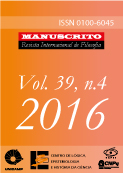Resumen
Even though fatalism has been an intermittent topic of philosophy since Greek antiquity, this paper argues that fate ought to be of little concern to metaphysicians. Fatalism is neither an interesting metaphysical thesis in its own right, nor can it be identified with theses that are, such as realism about the future or determinism.Citas
BARNES, E. and CAMERON, R. “The open future: bivalence, determinism and ontology”, Philosophical Studies, vol. 146, pp. 291–309, 2009.
BELNAP, N. and GREEN M. “Indeterminism and the thin red line”, Philosophical Perspectives, vol. 8, pp. 365–388, 1994.
BIGELOW, J. “Presentism and properties”, Philosophical Perspectives, vol. 10, pp. 35–52, 1996.
BOURNE, C. “Future contingents, non-contradiction, and the law of excluded middle muddle”, Analysis, vol. 64, pp. 122–128, 2004.
CORREIA, F. and IACONA, A. (eds.). Around the Tree: Semantic and Metaphysical Issues Concerning Branching and the Open Future. Dordrecht and New York: Springer, 2013.
DIEKEMPER, J. “Temporal necessity and logical fatalism”, Proceedings of the Aristotelian Society, vol. 104, pp. 289–296, 2004.
DUMMETT, M. “Bringing about the past”, Philosophical Review, vol. 73, pp. 338–359, 1964.
GOODMAN, N. “‘About’ mistaken”, Mind, vol. 74, p. 248, 1965.
HUME, D. Enquiries Concerning Human Understanding and Concerning the Principles of Morals. London: T. Cadell, 1777.
LEWIS, D. On the Plurality of Worlds. Oxford: Blackwell, 1986.
ŁUKASIEWICZ J. “On determinism,” in Selected Works (pp. 110–128). Amsterdam: North-Holland, 1970.
MACFARLANE, J. “Future contingents and relative truth”, Philosophical Quarterly, vol. 53, pp. 321–336, 2003.
MACFARLANE, J. “Truth in the garden of forking paths,” in M. Kölbel and M. García-Carpintero (eds.). Relative Truth (pp. 81–102). Oxford: Clarendon Press, 2008.
MCARTHUR, R. “Factuality and modality in the future tense”, Noûs, vol. 8, pp. 283–288, 1974.
ØHRSTRØM, P. “Anselm, Ockham and Leibniz on divine foreknowledge and human Freedom”, Erkenntnis, vol. 21, pp. 209–222, 1984.
PRIOR, A. “Three-valued logic and future contingents”, Philosophical Quarterly, vol. 3, pp. 317–326, 1953.
PRIOR, A. Past, Present and Future. Oxford: Clarendon Press, 1967.
PUTNAM, H. “Formalization of the concept ‘about’”, Philosophy of Science, vol. 25, pp. 125–130, 1958.
RESCHER, N. “A note on ‘about’”, Mind, vol. 72, pp. 268–270, 1963.
RYLE, G. Dilemmas. Cambridge: Cambridge University Press, 1956.
THOMASON, R. “Some completeness results for modal predicate calculi”, in K. Lambert (ed.). Philosophical Problems in Logic (pp. 56–76). Dordrecht: Reidel, 1970.
TOOLEY, M. Time, Tense, and Causation. Oxford: Clarendon Press, 1997.
TORRE, S. “The open future,” Philosophy Compass, vol. 6, pp. 360–373, 2011.
VAN INWAGEN, P. “The incompatibility of free will and determinism,” Philosophical Studies, vol. 25, pp. 185–199, 1975.
VOLTAIRE Candide, ou l’Optimisme. Paris, 1759.
YABLO, S. Aboutness. Princeton: Princeton University Press, 2014.

